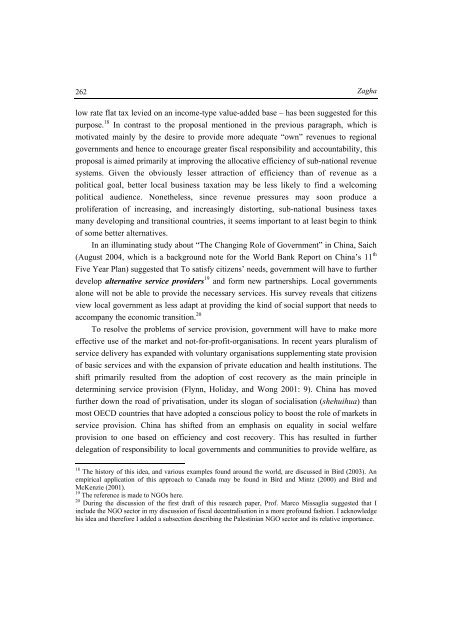The Palestinian Economy. Theoretical and Practical Challenges
The Palestinian Economy. Theoretical and Practical Challenges
The Palestinian Economy. Theoretical and Practical Challenges
You also want an ePaper? Increase the reach of your titles
YUMPU automatically turns print PDFs into web optimized ePapers that Google loves.
262<br />
Zagha<br />
low rate flat tax levied on an income-type value-added base – has been suggested for this<br />
purpose. 18 In contrast to the proposal mentioned in the previous paragraph, which is<br />
motivated mainly by the desire to provide more adequate “own” revenues to regional<br />
governments <strong>and</strong> hence to encourage greater fiscal responsibility <strong>and</strong> accountability, this<br />
proposal is aimed primarily at improving the allocative efficiency of sub-national revenue<br />
systems. Given the obviously lesser attraction of efficiency than of revenue as a<br />
political goal, better local business taxation may be less likely to find a welcoming<br />
political audience. Nonetheless, since revenue pressures may soon produce a<br />
proliferation of increasing, <strong>and</strong> increasingly distorting, sub-national business taxes<br />
many developing <strong>and</strong> transitional countries, it seems important to at least begin to think<br />
of some better alternatives.<br />
In an illuminating study about “<strong>The</strong> Changing Role of Government” in China, Saich<br />
(August 2004, which is a background note for the World Bank Report on China’s 11 th<br />
Five Year Plan) suggested that To satisfy citizens’ needs, government will have to further<br />
develop alternative service providers 19 <strong>and</strong> form new partnerships. Local governments<br />
alone will not be able to provide the necessary services. His survey reveals that citizens<br />
view local government as less adapt at providing the kind of social support that needs to<br />
accompany the economic transition. 20<br />
To resolve the problems of service provision, government will have to make more<br />
effective use of the market <strong>and</strong> not-for-profit-organisations. In recent years pluralism of<br />
service delivery has exp<strong>and</strong>ed with voluntary organisations supplementing state provision<br />
of basic services <strong>and</strong> with the expansion of private education <strong>and</strong> health institutions. <strong>The</strong><br />
shift primarily resulted from the adoption of cost recovery as the main principle in<br />
determining service provision (Flynn, Holiday, <strong>and</strong> Wong 2001: 9). China has moved<br />
further down the road of privatisation, under its slogan of socialisation (shehuihua) than<br />
most OECD countries that have adopted a conscious policy to boost the role of markets in<br />
service provision. China has shifted from an emphasis on equality in social welfare<br />
provision to one based on efficiency <strong>and</strong> cost recovery. This has resulted in further<br />
delegation of responsibility to local governments <strong>and</strong> communities to provide welfare, as<br />
18 <strong>The</strong> history of this idea, <strong>and</strong> various examples found around the world, are discussed in Bird (2003). An<br />
empirical application of this approach to Canada may be found in Bird <strong>and</strong> Mintz (2000) <strong>and</strong> Bird <strong>and</strong><br />
McKenzie (2001).<br />
19 <strong>The</strong> reference is made to NGOs here.<br />
20 During the discussion of the first draft of this research paper, Prof. Marco Missaglia suggested that I<br />
include the NGO sector in my discussion of fiscal decentralisation in a more profound fashion. I acknowledge<br />
his idea <strong>and</strong> therefore I added a subsection describing the <strong>Palestinian</strong> NGO sector <strong>and</strong> its relative importance.
















